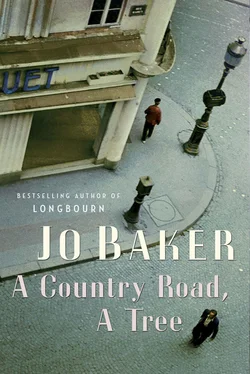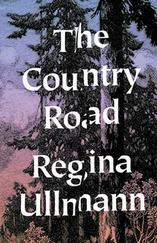Up at the stables, the windows are being boarded up, the locks fitted, the shelves clapped together out of packing crates.
Striding across the waste ground, his eye catches on colour. High up, on a windowsill, in a tooth of remaining wall, the two boys perch, legs dangling, looking down on the work going on there like little gods. He watches as the younger tugs at the elder’s sleeve; they slither down and scramble away. They leap from the end of a buried bedstead, tight-rope round the rim of a fallen window frame, thunder over a flattened door. The blot of red shrinks, then disappears amongst the ruins.
—
The men are piecing together the flat sides of the first hut like a gingerbread house when it begins to rain. The water dots and darkens the wood. The roof goes on in slabs, seals off the space beneath it, changes its nature from outdoors to in. The rain chills the skin; it soaks through tunics and trousers, it traces streams upon the gritty earth, teases in between the rubble, makes white runnels of plaster dust and broken-up cement.
His boots sink into the clay, suck out of it. Rain streams down his face and into his eyes and brings with it the salt of his skin and makes his eyes sting. The men take their boots off at the door. They pad across the boards in damp socks. The beds are hustled in, the bedding unpacked and rolled out. A chair, a locker, a bed each. One simple room for the eight of them to sleep and eat and write and read in, till all the other rooms are built. The rain runs off the new pitched roof and into guttering, and away.
Elsewhere, the rain drips through botched-up roofs and oozes in through heaped rubble and trickles down into cellars so that women go barefoot to save their shoes, and there is nowhere safe to put the baby down.
He writes a letter, wraps a parcel to Suzanne. Biscuits, coffee, a small packet of powdered milk, gleaned from his rations. He doesn’t need as much as he is given. He barely draws on his salary here; he is saving hard to repay the Larbauds.
That night, he lies awake in the dark, listening to the breathing of the sleeping men. Listening to the scratch of rats through heaps of broken stone.
—
By day, the site is an anthill, a Babel tower. Bricklayers hoist hods and slop cement, a team of Algerians rolls the hardcore flat between the huts; there is the smell of cut timber, and the grate and sigh of the saws, and the spooling out of cable and setting in of pipe, and voices raised in different languages and in heavily accented attempts at others. Fights do not break out. Sometimes, though, already, laughter does.
The stores, housed away from the main site, up above the stables, are bustling. Supplies arrive and are sequestered; people come with chits and dockets that must be filled and filed and the duplicate returned. Below, the horses thud hooves against their wooden stalls. Rain drips where a slate is missing, rain spills gurgling from a blocked gutter, wet footprints darken the floor. But, despite all the come-and-go, this remains a solitary place. It’s his.
Though there is company here today in the form of a prisoner who is wiring the place for light.
“Here,” the prisoner says in German. “Do you want to see how it’s done?”
He watches blunt fingers manage surprisingly delicate operations, tweak and twist bright copper strands, fiddle in tiny screws. The work is deft and precise and there is a clear logic to it, a followable flow.
“I see.”
The prisoner inclines his head, still squinting at the work.
“My gaffer always said,” he says, “gas light’s kinder on the ladies, but electricity’s sharper, electricity’s the thing.”
“He was right.”
“He was always right. At least, he was until he wasn’t.”
Then the prisoner clips the casing closed and twists in another screw to hold the whole thing shut. He flips the heavy switch. Light leaps; it scatters itself through the maze of shelving and slaps itself on to the stacked packing crates. It casts the prisoner’s thin face in deep shadow.
“Job’s a good one.”
He proffers his cigarettes. The two of them sink down, side by side, backs against a packing crate. He strikes a match; they lean in. The electric light is a brilliant cone over them.
“Only use the lamps when you really need them,” the German says, gesturing upward. “Or you’ll run out of diesel in no time.”
“Good point.”
The refrigerators hum and the lights fizz and the generator rattles and the boards are hard beneath him, and the lamp burns down on them like a spotlight, and he’s aware too of the sweat-and-tobacco stink of the man beside him and the heave of smoke into his lungs, and its slow spool out of him, and the reality of all of it is insistent, demanding to be noticed. He wants, oh God, he needs. Time, a locked door at his back, and time. Pen and paper and an empty notebook and no concern as to what the end will be, but the means, please God, he needs the means, he needs to write, he needs to shuffle the cards, tamp down the pack. He needs the quietude that it brings. He needs to learn.
He heaves himself up, pads over to switch off the light.
He hears the puck of cigarette from lips. “It used to be beautiful,” the fellow says. “Where I’m from, I mean. My town. But it’s all been bombed to shit like this place too.”
“I’m sorry.”
“Thorough, your lot, when it comes to that kind of thing.”
“They’re not my lot.”
“Which lot are your lot, then?”
He shrugs. “I don’t have a lot.”
The other says, “I’m not going back.”
“You mean, home?”
“I wrote to my wife, I always did since I was conscripted, but the moment that I heard about the bombing I wrote. I’ve written to her thirty-two times since. After the first three letters and nothing back, I started writing to my mother-in-law too, and when nothing came of that either, I sent notes to friends, the neighbours, and to my daughters’ schoolteachers, and then to the priest, and then the doctor. I sent a postcard to the grocer, asking how business was, letting him know how things were going here.”
He rolls his cigarette along his middle finger with his thumb. He looks at the fellow sidelong, waiting.
“They don’t reply. But I keep on writing, and I’m never going back. So. There we are.”
He gets to his feet, leaves the other fellow sitting. Through the maze of the stores, he makes his way to where a box is tucked in behind a bigger box, and he fishes out the bottle of Jameson’s and two enamel mugs. He brings them back, sinks down and pours large measures for them both. They sit in the shadows, and they drink.
—
At the outpatients’ department, people queue for half the day. They bring scabies, bronchitis, arthritis and tuberculosis from their damp and overcrowded dwellings. They bring burns, scalds, contusions and raw open wounds wrapped in grubby tea-towels and handkerchiefs. Tired people are clumsy, and everybody’s tired here: who can sleep with the rain dripping in on them, with their stomachs growling, with the kids coughing all night long? And everything is botched together, provisional, unsteady here, and so accidents happen: there is nowhere safe to cut up a potato, or put a hot pan down.
And children play in the ruins, since there is nowhere else to play. Masonry falls in showers on them. Cellars cave in underneath their feet. They pick up detonators in a grubby palm and call their friends to see. They get caught up in twisted rusty wire, and fall on broken glass.
Even in the countryside, people are not safe. Farm labourers are rushed in from the fields, only a tourniquet and their own cussedness to keep them from bleeding out in the back of their neighbour’s car. There are landmines everywhere, and all sorts of unexploded ordnance, and there is not another hospital for a hundred miles.
Читать дальше










